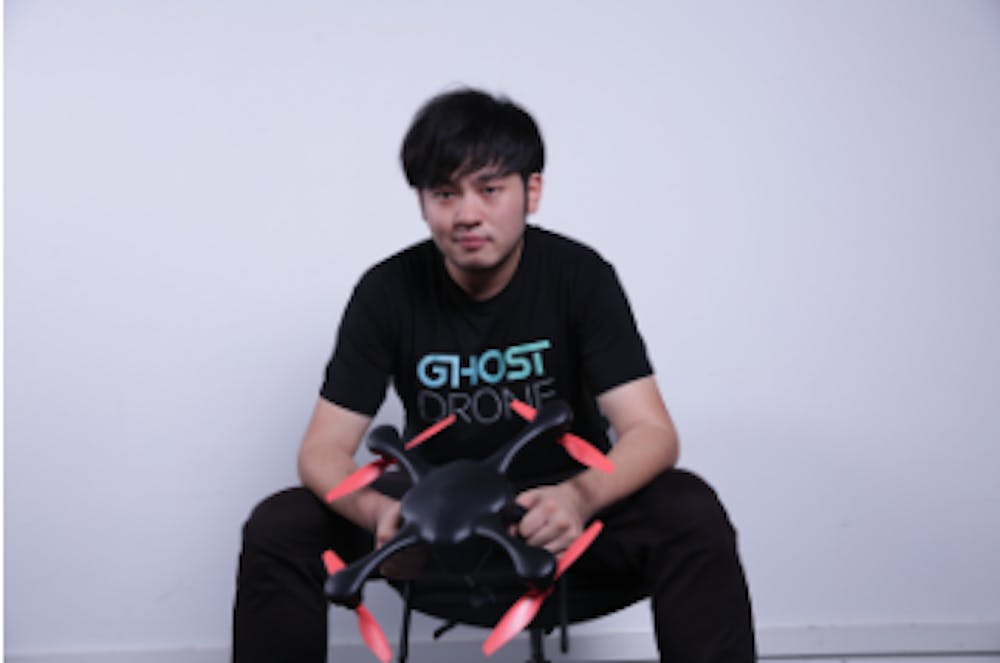A drone company co-founded by a Duke alum is working to make recreational drones that can carry humans.
Derrick Xiong, Fuqua ’13, co-founded the company EHang in 2014. The startup has made headlines recently for its development of the EHang 184 Autonomous Aerial Vehicle, the world’s first passenger-ready drone that can transport a single person and can be fully controlled through a mobile app.
Xiong, who is now the chief marketing officer of EHang, said that he has always been fascinated by innovative technology, such as virtual reality goggles. As an international student from China, he learned international marketing during his time studying abroad at Duke and in Singapore.
“I noticed that in China there were tons of start-ups with good hardware, but they didn’t really know how to do the branding, especially overseas," Xiong said. "That’s my position for myself in China. The gap I was trying to fill was exactly what they needed."
The idea for EHang came when Xiong saw a man piloting a drone using a smartphone instead of the typical radio controller, Xiong explained. The man, Huazhi Hu, had quit his job to start creating these drones. Hu later co-founded EHang with Xiong.
Xiong first used crowd-funding sites Kickstarter and Indiegogo to help launch the company in April 2014. Although the product was still in the rough prototype stages, Xiong said that their efforts raised $860,000 by November 2014.
“It wasn’t enough to start the company but proved that we had a good idea,” Xiong said.
When EHang was founded, the company had just four employees and was housed in an empty building of an abandoned theme park. The company has since expanded to almost 300 employees with branches in Silicon Valley, Beijing and Dusseldorf, Germany.
EHang's drones can be controlled with a phone and are referred to as "ghost drones."
“It’s like playing a Nintendo Wii and holding a joystick,” Xiong said. “If you tilt forward, the drone will fly forward. If you tilt left, then it will go to the left.”
EHang’s latest product, the Ghost 2.0 drone, includes virtual reality goggles that show users what the drone sees in real time. This drone—priced at $1,000—can fly approximately half a mile high and can take photographs and videos in the air.
Since the launch of the EHang 184 in January, EHang has fixed many of the drone’s technical problems, including improving its exterior aesthetics, adding air conditioning and enhancing safety features. Xiong explained that the EHang 184 flies at a low altitude to avoid hitting buildings or planes and can travel for more than 20 miles on its 23-minute battery. When the drone hits the market, it is projected to retail between $200,000 and $300,000, he said.
Xiong noted that Fuqua's emphasis on finance contributed to his success with the company.
“There were not many people interested in start-ups and entrepreneurship compared to finance and marketing,” Xiong said. “If you go to schools like Stanford or Berkeley, everyone is talking about start-ups—not at Duke though.”
The summer after Xiong’s graduation from Fuqua, he received funding to do the Innovation and Entrepreneurship Initiative's summer innovation program in San Francisco, where he worked in an incubator on an app for three months. Xiong said that this program provided him with valuable expertise, which he would later employ at EHang.
“I always appreciate what I was offered from the summer innovation program. I was a student without any funding from my parents, which is uncommon of Chinese students, and my whole dream was creating a start-up,” Xiong said.
Xiong noted that Jon Fjeld, professor of the practice in Fuqua and executive director of the Center for Innovation and Entrepreneurship, and Howie Rhee, managing director of the CEI, were his biggest mentors during his time at Duke. Xiong added that he still talks to Fjeld on a weekly basis to receive advice for EHang.
Fjeld and Rhee both recommended that Xiong return to China, which Xiong said was pivotal to his career success.
“I was rare in China,” he said. “How you position yourself when you want to pursue your career is very important.”
Get The Chronicle straight to your inbox
Signup for our weekly newsletter. Cancel at any time.

